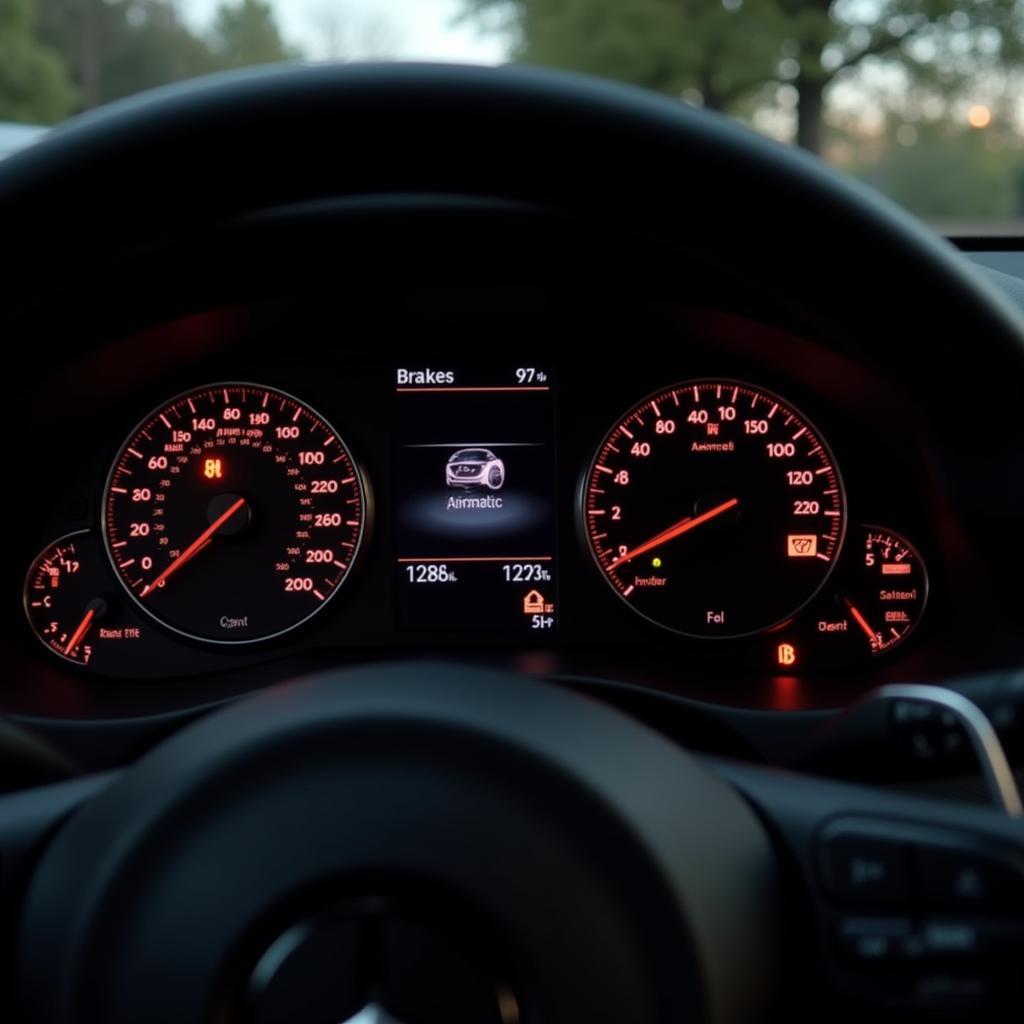The brake warning light on your dashboard is a crucial safety feature, designed to alert you of potential issues within your braking system. If you own a 2002 Ford Explorer and this light stubbornly refuses to switch off, it’s a clear sign that your SUV needs immediate attention. Ignoring this warning could lead to reduced braking performance and potentially dangerous situations on the road.
This comprehensive guide will delve into the common causes behind a lit brake warning light in a 2002 Ford Explorer, empowering you to diagnose the issue and explore suitable solutions.
Common Culprits: Why is My Brake Warning Light On?
Several factors can trigger the brake warning light in your 2002 Ford Explorer. Let’s shed light on some of the most frequent culprits:
1. Low Brake Fluid Level: The Heart of the Matter
The most common reason for the brake warning light to illuminate is a low brake fluid level. Brake fluid is the lifeblood of your braking system, responsible for transmitting the force applied to the brake pedal to the wheels, ultimately stopping the vehicle.
Over time, brake pads wear down, and as they do, the brake fluid level naturally decreases within the reservoir. If the fluid level drops significantly, it can trigger the warning light.
Expert Insight:
“Always check your brake fluid level as part of your routine vehicle maintenance. It’s a simple visual inspection that can prevent major braking problems down the line,” advises Mark Stevenson, a seasoned automotive engineer with over 20 years of experience in vehicle diagnostics.
2. Worn Brake Pads: Time for a Change
Brake pads are designed to wear down over time. They are your first line of defense when braking, generating friction against the brake rotors to slow down and stop your vehicle. As brake pads wear thin, the brake caliper pistons need to extend further to engage the rotors. This action can lead to a lower brake fluid level, triggering the warning light.
3. Brake Fluid Leak: A Cause for Concern
A leak in your brake lines, hoses, or calipers can result in a loss of brake fluid, leading to a drop in pressure and illuminating the warning light. This is a serious safety concern and should be addressed by a qualified mechanic immediately.
4. Faulty Brake Light Switch: A Common Culprit
The brake light switch, located above the brake pedal, is responsible for activating your brake lights when you press the pedal. If this switch malfunctions, it can also trigger the brake warning light.
5. ABS Issue: A More Complex Problem
The Anti-lock Braking System (ABS) is a crucial safety feature that prevents wheels from locking up during braking, ensuring better control and stability. If there’s a problem with the ABS system, such as a faulty sensor or a malfunctioning control module, the brake warning light may illuminate.
Troubleshooting the Brake Warning Light: A Step-by-Step Guide
If your 2002 Ford Explorer’s brake warning light refuses to budge, follow these steps to pinpoint the root cause:
-
Check the Brake Fluid Level:
- Locate the brake fluid reservoir under the hood.
- Check the fluid level against the “Min” and “Max” markings on the reservoir.
- If the level is low, add the correct type of brake fluid as specified in your owner’s manual.
-
Inspect the Brake Pads:
- If possible, visually inspect the brake pads through the wheel spokes.
- If the pads are thin or you can’t see them clearly, it’s best to have them checked by a mechanic.
-
Look for Brake Fluid Leaks:
- Inspect the ground under your vehicle for signs of brake fluid leaks.
- Look for wet spots on the brake lines, hoses, and calipers.
Expert Insight:
“Never drive a vehicle with a suspected brake fluid leak. This is a serious safety hazard. Have the vehicle towed to a qualified mechanic for inspection and repair,” cautions Mr. Stevenson.
-
Check the Brake Light Switch:
- The brake light switch is located above the brake pedal. You can often test it by depressing and releasing the brake pedal while observing if the brake lights illuminate. If not, the switch may be faulty.
-
Consult a Mechanic for ABS Issues:
- Diagnosing and repairing ABS issues requires specialized tools and expertise. If you suspect a problem with your ABS system, it’s best to consult a qualified mechanic.
Conclusion: Prioritizing Brake Safety
A glowing brake warning light in your 2002 Ford Explorer is not a matter to be taken lightly. By understanding the potential causes and following the troubleshooting steps outlined in this guide, you can address the issue promptly and ensure the safety of yourself and your passengers.
Remember, when it comes to brakes, erring on the side of caution is always the wisest course of action. If you’re unsure about any aspect of brake repair or diagnosis, consult a qualified mechanic for expert assistance.

